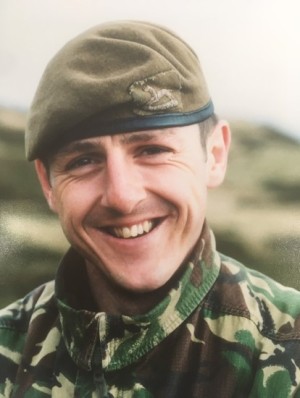Case studies
Craig Powers

After enlisting with the Prince of Wales’ Own Regiment of Yorkshire, latterly the Yorkshire Regiment, in May 1996 at the age of 23, Craig Powers spent 21 years moving between positions in England, Scotland, Germany and Gibraltar, with tours in Northern Ireland, Sierra Leone, Iraq and Afghanistan.
In 2017, aged 44, he decided with his wife Helen that they wanted more stability. He was serving as the Executive Officer at the Glasgow and Strathclyde Universities Officer Training Corps and they knew they wanted to settle somewhere nearby and own their own home. Buying a house in Ayrshire cemented Craig’s decision and he left the Army in November 2017. For the first time in two decades he had to consider employment outside the military.
“In the Army, your job is guaranteed and there are no applications or interviews. I was leaving this comfort and security for something completely unknown. The biggest challenge for me was figuring out what I could do, what I wanted to do and where to start looking.
“The first thing I did was get my CV sorted, but I didn’t really know where to start. One of the biggest challenges was vocabulary. We’re bad at selling ourselves and we underestimate our skills because we can’t see how they fit in the civilian world. A civilian friend rewrote my CV for me and I didn’t recognise the person they were writing about.
“I spoke to a lot of former colleagues and sought support from the Careers Transition Partnership and the Officers Association Scotland, as well as trawling regular civilian recruitment websites to try and determine my next steps. I came to the realisation that project management was probably the way forward.
“When it came to applying for jobs, I hadn’t appreciated how long the process could take – from seeing the advert to actually starting in a position – and I also hadn’t considered how much application processes varied between companies. Some required CVs, some required applications which would always be different. When it came to demonstrating core competencies and alignment with company values, all of my examples were from the Military and it was difficult to translate them.
“In interviews I found it hard to talk about myself – in the Military you’re always part of a team and you always talk about ‘we’. It was difficult to single myself out and talk about my own individual attributes.
“Although I was met with a lot of support when I sought it, I think basic help with preparation of CVs and being given a more comprehensive understanding of the jobs market and potential recruitment processes when leaving the Army would be hugely beneficial to many Service Leavers.”
Craig started a project management position with Transport Scotland in March 2018 and after eighteen enjoyable months as a civilian he joined the Reserves, which he says allowed for a healthy work-life balance.
“It’s great being able to come home every night to my wife, to walk the dog, and to work regular hours and see my friends often. It’s true that when you’re serving your country you’re often putting your life on hold, however, this has a far bigger impact on your family. As well as having to put up with me being away for long periods of time, my wife Helen had to retrain four times throughout my military career so she could move around with me and continue working.
“Although she was a registered nurse, the NHS wouldn’t employ her because they could see how often she moved around. I think the Covenant is a great initiative that should hopefully help address these issues and ensure that consideration is given for Military spouses.”
Being highly independent and driven, Helen has forged her way through to establish her own upholstery and vintage furniture business without seeking support from any Forces organisations.
“Leaving the Army gave us the stability for Helen to start her own company which she wouldn’t have been able to do before. Although she has never sought support from any Forces organisations in relation to training and employment, something that I think would be beneficial would be for Service Leavers to have the option to transfer their annual Standard Learning Credits to their spouse if they don’t have any other use for them. This could be a real help to a lot of spouses looking to retrain to find work or develop necessary skills to start their own venture.
“Overall, my transition to civilian life has been pretty seamless. The grass isn’t always greener, but sometimes you’ve got to see what’s over the fence – and I’m glad I did; no regrets.”



